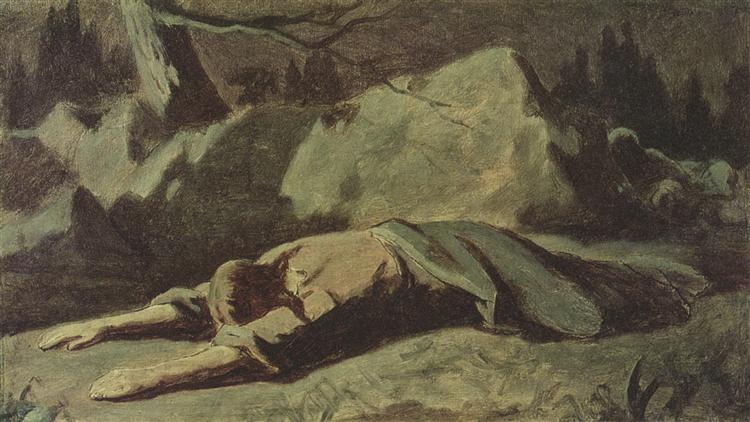Aaron Perry ~ The Troubled Savior

“Do not let your hearts be troubled” (John 14:1-31).
Imagine how the disciples are feeling in this moment. Jesus has just predicted Peter’s denial and another’s betrayal: they could hardly be a happy group. How would his words have been heard? Would they have been comforting?
“Do not let your hearts be troubled.” Certainly more easily said than done. How are we to hear them? The word “troubled” has been used before in John’s Gospel.
Jesus was troubled when Martha wept at Lazarus’ death (11:33); Jesus was troubled as he saw the time for his death had come (12:27); Jesus was troubled when he told the disciples of Judas’ coming betrayal (13:21). Do you see the connection? They are all connected with Jesus’ death. (Read the previous article in this brief series to see the connection with Martha’s weeping at Lazarus’ and Jesus’ death.)
Jesus was troubled at his own death, yet he tells the disciples not to be troubled. Why would he do this? Better yet, how could he do this? Isn’t it inconsistent?
Recall John’s narrative of Jesus washing the disciples’ feet. John tells us that the hour had come for Jesus to go to the Father and that Jesus, having loved those who belonged to him, now showed them his love to the full (13:1). In washing the disciples’ feet, Jesus took the posture of a slave, a posture Jesus would show fully on the cross. So, why was Jesus troubled by his own death, but told the disciples not to be troubled?
Because Jesus was taking their trouble on himself. Jesus was troubled because he was going to die a death that would make a way for their life. He took their “trouble” and made it his own so that his life could be made theirs. He took their trouble, so there was no need for them to be troubled.
Let’s go a little deeper. Jesus said he was going to the Father and that the disciples would follow at a later time (13:36) and by going to the Father, Jesus would make room for us to abide (14:2). Jesus also said that he and the Father will come to abide (“make our home”) with those who love Jesus (14:23).
Do you see what is happening? Just as God made a way through the waters in the Exodus (and recalled in Isaiah 43:16), so does Jesus walk on the water in John’s Gospel (6:16-24). When pressed by the disciples’ ignorance of where he is going and their subsequent ignorance of the way, Jesus says, “I am the way” (14:6). Jesus is the way to the Father. Through his death, Jesus opens a way to the Father. He has made a way through trouble by his death and so while his death troubles Jesus, through it he is able to say, “Do not be troubled.”
“Wait a minute,” you might be asking. “Didn’t Jesus say that in this world we would have trouble?” The phrase comes from John 16:33, but John uses a different word here. In John 14, John uses the word tarasso (trouble) whereas in John 16:33 he uses the word thlipsis (tribulation).
We might say it like this: Don’t let the tribulations trouble you. Tribulations are those things that press us down, that afflict us. They are profound and they matter. They are the expected pressures and trials of life, of being part of a world at odds with God. But trouble is a deeper disquiet, anxiety, uneasiness. Trials will come and even so troubles can be dismissed because Jesus has made a way. The deepest danger of life has been solved.
But this brings us back to the start, doesn’t it? Don’t be troubled? Isn’t that easier said than done? It is.
It is hard to endure the tribulations and to dismiss the trouble. Let me draw a seemingly light-hearted parallel. “Don’t worry; be happy.” Do you remember the phrase? If not, then go to YouTube and watch the video. Even if you don’t know the song, the phrase can still be heard in everyday conversation, even 30 years after it was used as the title of Bobby McFerrin’s hypnotic tune that stayed atop Billboard Hot 100 chart for two weeks in 1988. The words are effortless, epitomizing what it means to be “easier said than done.”
If you’ve ever been told, “Don’t worry; be happy,” “Calm down!”, “Just take it easy,” “Settle down,” or, for our purposes, “Don’t be troubled,” you might know that the words can have the opposite effect. Without due seriousness, they can sound dismissive, raising our suspicion rather than calming our nerves, coming across as condescending rather than empathetic. Depending, of course, on the speaker. “Don’t worry; be happy.” McFerrin’s song was prevalent on the relaxed island in the wake of Hurricane Gilbert. If the words came from a Jamaican survivor of this devastating hurricane, then you might pay attention. When people have gone through actual turmoil, pain, and anxiety, their words might carry a little more weight. I think we can learn to take at his word the one who gave us these words.
“Do not be troubled” means something coming from the one who took our trouble on himself and made a way through his own trouble.
These are not easy words; they are good words. They are not flippant words, rolling off the tongue; they are earned words, spoken because the cross was endured. So, how ought we to hear these words?
Perhaps, especially on days when their application seems so impossible, we can hear them as a promise. A way has been made; a day is coming when our hearts will not need be troubled.
Note from the Editor: The featured image for this reflection is “Christ in Gethsemane” by Vasily Perov.